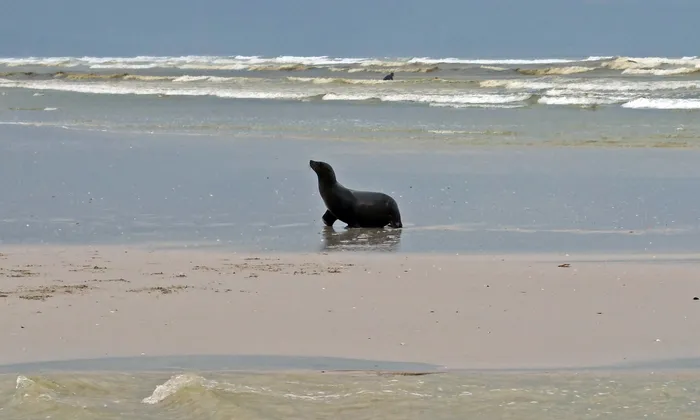Public warned against engaging with seals at the beach

In the run-up to the summer beach season, CapeNature warns the public to stay away from seals on the beaches. Pictured above a seal on Muizenberg beach. PICTURE: IAN LANDSBERG
In light of recent reports of aggression and positive rabies cases noted in the Cape fur seal populations, CapeNature has issued a warning to the public to steer clear of seals on the beaches this summer season.
“These marine mammals are an integral part of our coastal ecosystem, but it is crucial to recognise that human-wildlife interactions can have severe consequences,” the institution said in a statement.
They urged people to stay away from seals and to not make any attempt to touch or engage with them.
According to the institution, any activities that disturb seals are illegal according to the NEMBA (National Environmental Management: Biodiversity Act) TOPS (Threatened or Protected Species) regulations without a permit.
These activities include petting as it disturbs the animal’s natural behaviour and exposes individuals to potential dangers, including bites and scratches. The institution warns that even if people come across a seal pup, interaction should be avoided.
“The public should contact the authorities who are trained and equipped to rescue and care for such animals.
“While it is common for seals to haul out on beaches to rest and for deceased seals to wash ashore having died from natural causes, it is important to recognise any signs of distress or abnormal behaviour. Seals may display defensive behaviour if they feel threatened or are injured,” they said.
Seals infected by rabies, can show aggressive behaviour and rabies can be transmitted to those they come in contact with. CapeNature warns that rabies can be transmitted through bites, scratches and other forms of direct contact with saliva and is fatal for humans and animals that have not been vaccinated.
If your pet has been bitten by a seal, the recommendation is to take the animal to the nearest veterinarian immediately. Try to give the veterinarian as much details of the incident, the wound, the treatment received and your pet’s vaccination history.
Lisa Starr from the Helderberg Ocean Awareness Movement (HOAM), based in the Helderberg basin and committed to marine conservation and the protection of local beaches, reiterated the importance of why people need to steer clear of seals encountered on the beach.
“We highly recommend that you stay at least 30 metres away from resting seals on the shore. This has always been our advice as they are wild animals and will protect their space.
“If you are in the ocean and you see you see a seal then leave the ocean and wait till the seal leaves. We haven’t had any incidents here yet and if people stay away from resting seals we won’t do,” she said.
She recommends those visiting the beaches to leash their dogs on the doggy allocated beaches at the moment, to prevent them from coming into contact with any seals.
CapeNature says: “Swimmers and surfers must remain extra vigilant while in the sea. If a seal is spotted, exit the water immediately and report it to the lifeguards or municipal authorities.”
Dr Ashley Naidoo, CEO of CapeNature, said: “The recent confirmation of rabies in our local seal population is a reminder of the importance of the caution that is required in our coexistence with wildlife and the need for vigilance. By following these guidelines, we can help prevent the spread of this serious disease and protect both human and animal health.
“We encourage everyone to stay informed and proactive in their interactions with wildlife during this critical time.”
In case of a seal bite:
- If a seal bites someone in the water, the beach will be closed immediately, marked by the activation of a shark siren and the raising of a shark flag, if available.
- Shark spotters or lifeguards will promptly notify CapeNature and the State Vet, who will provide guidance on the necessary action. Municipal Disaster Management will also be informed.
- Lifeguards or first responders will monitor and track the seal’s movements.
- The beach will only reopen after the seal has been safely removed or has vacated the area.
- Anyone bitten should seek urgent medical care at the nearest hospital. At the scene, the wound must be thoroughly washed with soap and water for 10-15 minutes. Then, the person must be taken to the nearest hospital to receive rabies vaccinations. The patient needs to inform the hospital personnel that the bite is from a seal that may be rabid.
- A video of the seal’s behaviour should be captured and sent to CapeNature at 083 236 2924, including a location pin. This will be placed on the appropriate stranding network for advice and planned reaction.

Related Topics: